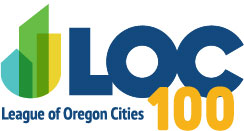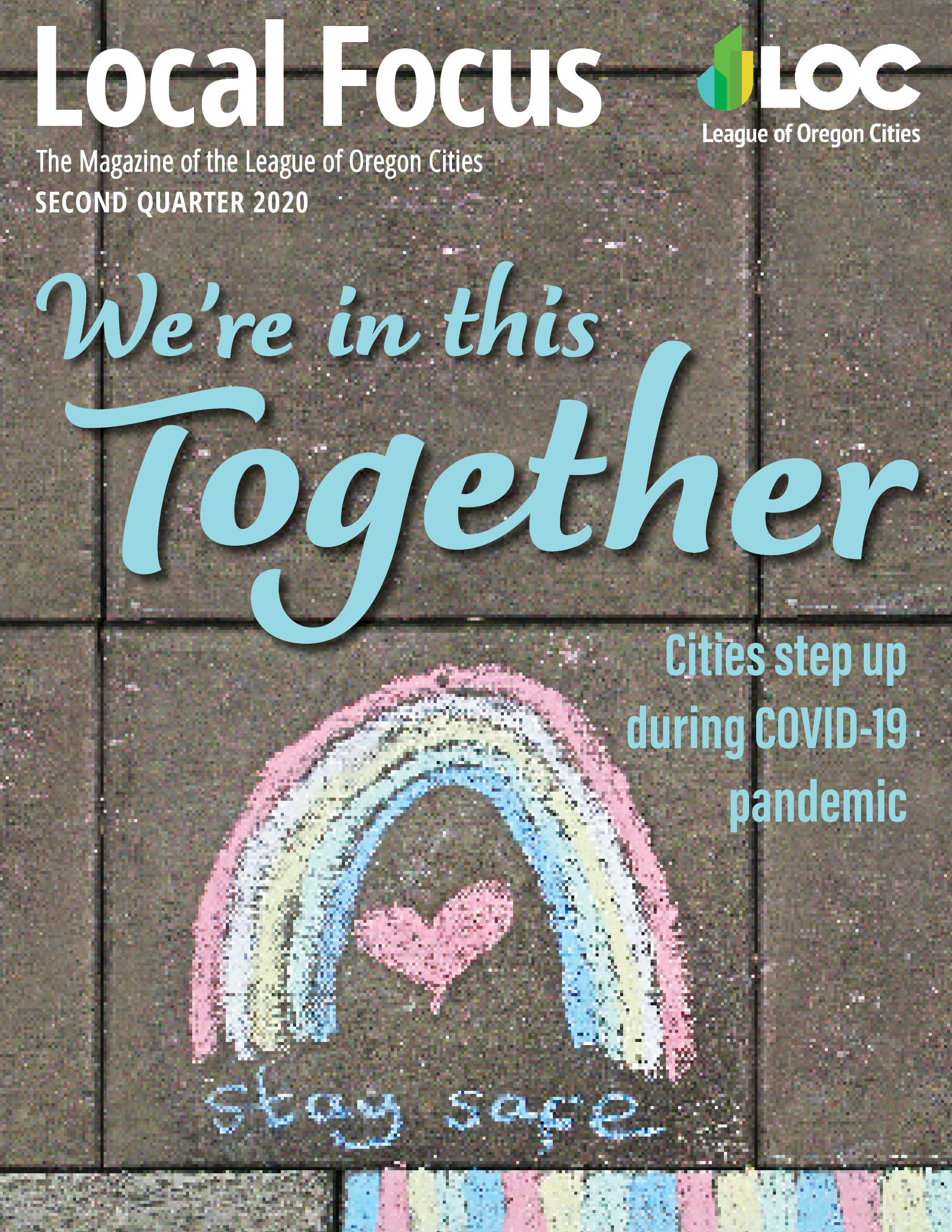
From Local Focus magazine
2nd Quarter 2020
Feature Article
Stories of Hope & Help
Communities Across the State Step Up to Provide Support During COVID-19 Pandemic
By Melody Finnemore
As Governor Kate Brown’s “stay-at-home” order took effect in March in response to COVID-19’s arrival in Oregon, communities across the state found ways to support vulnerable residents, business owners, healthcare professionals and others in need of a helping hand.
In the small city of Fossil, Mayor Carol MacInnes personally called most residents who have utility service to ask if they were staying home and staying safe, if they had enough supplies to last, if they had any concerns and how the city could help them. She also ensured residents had contact information for essential services that deliver supplies.
“I had several residents offer to help those that requested it. One was worried that she did not have a can of Lysol. I took her a can that I had from home,” MacInnes said. “Our community is striving to take care of each other and look out for the ones that need help during this time. I love Fossil.”
In Gresham, city staff has delivered supplies to more than 3,000 elderly and medically fragile residents through its “Operation Gresham Connected” campaign. A team of 40 city staff, whose normal work has been disrupted due to COVID-19, makes calls to check in with longtime utility account holders. Through the program, staff connects residents with resources and, in some instances, employees act as couriers for critical deliveries of medication and food.
“This is one of the most rewarding experiences of my life,” said Tina Osterink, natural resources planner, who volunteers for the program. “I feel like we are making a real difference.”
Gresham Mayor Shane Bemis noted that, “During this time of isolation, it’s more important than ever to stay connected and keep our community strong. Our incredible team of public servants is ready and willing to go beyond to help our elderly and our immunocompromised residents get through this challenging time.”
Tigard’s city leaders joined in the call for residents to stay connected through emails and information on the city’s website. The communications included encouraging tips from city councilors, “virtual fireside chats” from Mayor Jason Snider, information on available resources, lists of businesses that offer curbside service, and “Bet You Can’t Stump Us” Q&As with coronavirus-related questions submitted by residents.
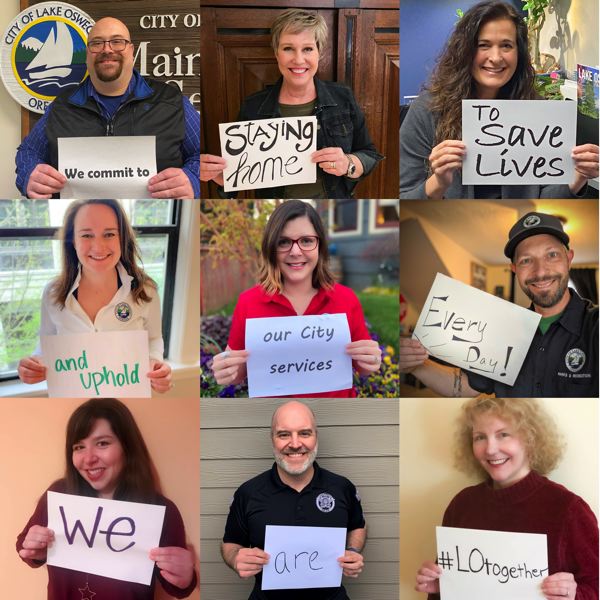
The city of Lake Oswego posts weekly collage photos and video messages from different departments on their social media pages each Friday. They have also posted video messages from each of their 7 councilors. Visit the city’s Facebook page and Twitter account.
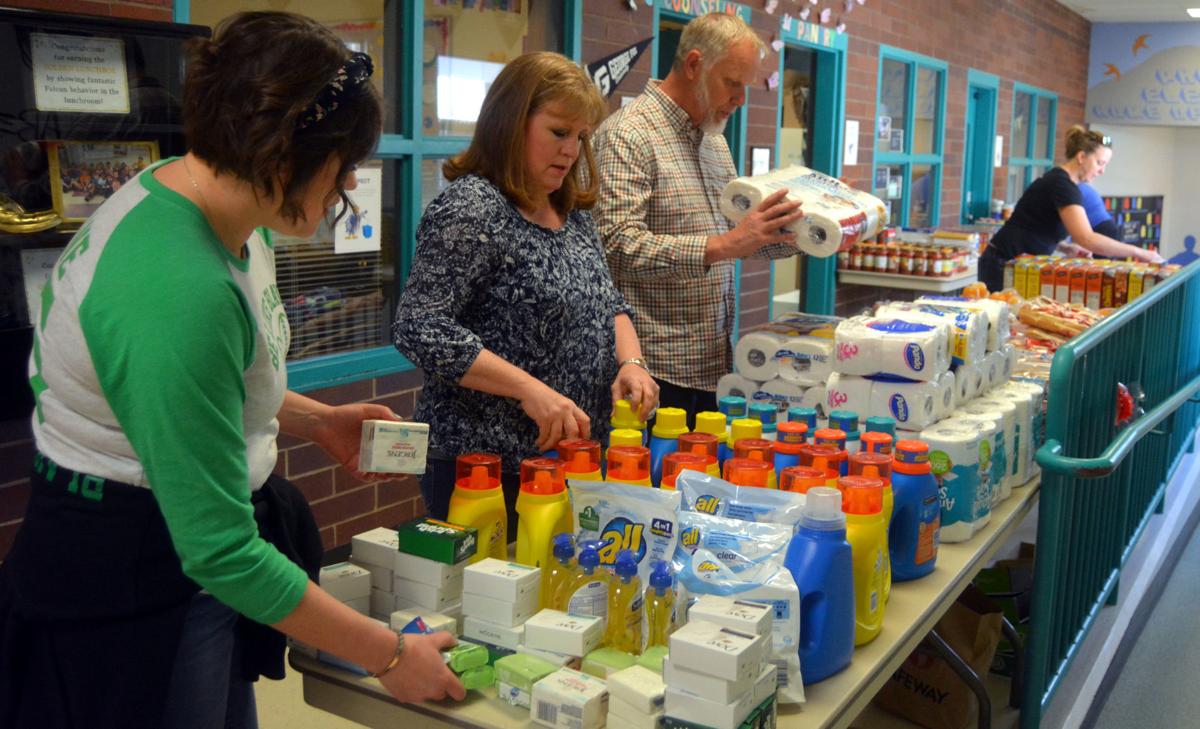
Philomath Food Bank served 35-40 families per week , distributing pre-packed boxes and bags with limited choices to expedite the process and limit contact.
Gearhart Mayor Matt Brown, in a March 22 letter in the Seaside Signal, stated his support for other leaders in coastal towns who implored tourists to stay home to help protect residents in their communities. He also praised local citizens who volunteered to sew hospital gowns and masks and respected physical distancing guidelines while continuing to stay socially connected and take care of themselves.
“This doesn’t mean folks are locking themselves inside. People are taking state officials’ and doctors’ advice and enjoying the outdoors, taking their dogs for walks, and taking advantage of our beautiful outdoor settings and open spaces,” he wrote. “Thank you for all you are doing and for keeping people safe and healthy!”
Other examples of community outreach and support abounded. The LOC wanted to share some of these stories of hope and help during this challenging time.
Feeding the Hungry
Beginning March 17, the Philomath Food Bank served about 35-40 families per week during its usual hours on Tuesday evenings and Thursday mornings. Under the direction of Karen Rowe, the food bank distributed pre-packed boxes and bags, with limited choices to expedite the process.
“We’ve limited the number of volunteers packing the boxes, and clients have limited contact with anyone. We’re maintaining good hand hygiene and sanitation practices,” said Jean Goul, president of the board of directors for Philomath Community Services.
Philomath Community Services partnered with the food bank and Linn Benton Food Share to provide food boxes for residents. Faculty at Philomath Elementary School also ensured students were fed with emergency food boxes for families.
In Willamina, a small rural community with a large aging-in-place population and many working residents laid off from the retail, restaurant and service sectors, the closure of government buildings effectively closed its city-run food pantry. The city joined forces with the Willamina Community Food Pantry to combine supplies, and the city’s Community Support Officer distributes the food to residents, Willamina City Manager Kenna West said.
“Prior to the pandemic the Willamina Community Food Pantry served 60 to 117 people per week. In the first week after the school closures, but before the huge layoffs, the pantry served 225 people,” she said, adding the city uses its Facebook page and utility bills to let residents know how they can receive food and other supplies. West said a local citizen who worked in one of the town’s restaurants that closed because of the pandemic volunteered to make hearty soups, freeze them in reusable containers and give them out at no cost each week. The containers each feed three adults.
“And, of course, our wonderful school nutritionist has made certain that there is a ‘grab and go’ lunch available at five different locations around our city daily and has even added a ‘breakfast bag’ for the children’s breakfast the next morning,” West added. “Our entire community has come together to help those who have been hardest hit by the COVID-19 pandemic.”
Yachats Mayor W. John Moore noted that when some of the coastal town’s restaurants were forced to close, they donated their perishable food to residents. The Yachats Presbyterian Church stepped up its food pantry and created an emergency fund to support residents who have been laid off, with a priority on those who are not covered by unemployment insurance.
“The church started the fund a few days ago with $5,000 seed money, and I understand it’s now over $15,000 and growing,” Moore said in March.
Helping the Helpers
In Coos Bay, a sewing and vacuum repair shop called The Electric Hospital sewed more than 100 hospital gowns for the North Bend Medical Center. Co-owner Joe Niell told KCBY that his staff acted as the brawn behind his wife Maria’s brain.
“Maria would sew gowns together and then we all put the straps on. We spent a lot of hours just sitting around and running five sewing machines. We like our community and we want to protect it,” he said, adding The Electric Hospital also created video tutorials on making protective masks out of vacuum bags.
Hendrix Heating in Corvallis adapted filter materials usually used for furnaces to create protective masks for healthcare providers in collaboration with local quilting groups and other healthcare assistance groups. The company advertised the free masks on its website and said it was reaching out to its police and fire departments as well.
Sublimity’s leaders challenged the town’s population of slightly less than 3,000 people to make 10,000 face masks or more to help slow the spread of COVID-19. City Councilor Greg Atkin is spearheading the effort and told KPTV/Fox 12 that the partnership also involved local businesses. Santiam Cleanery in Stayton provided its washers, dryers and presses to prepare the cotton fabric, and Silver Falls Engraving in Silverton and Cruisemaster Engraving in Sublimity offered laser cutting machines to cut fabric patterns.
“Really fortunate to have a number of neighbors step up and say, ‘I don’t have a whole lot, I have a few yards of fabric tucked away,’ or ‘Hey, I’ve got time, I’m at home and I’ve got a sewing machine,’” Atkin said.
Shelters and Showers
From Pendleton to Portland, cities and business owners took measures to ensure that people experiencing homelessness have a warm, safe place to stay every night through the pandemic.
Pendleton’s Marigold Hotel, one of scores of Oregon hotels that took an economic hit from COVID-19 closures, has provided shelter and food to the local homeless population since March 19,
housing 61 people in 46 rooms on one Monday night in March. City Councilor Carole Innes told the East Oregonian newspaper it was an easy choice to spearhead the project.
“They’re human beings. They’re people,” she said. “I mean, it’s that simple.”
Community Action Program of East Central Oregon (CAPECO) contacted Innes in mid-March to tell her funding had become available to help house homeless people during the pandemic. “But CAPECO staff was just swamped dealing with all the flood victims and all the issues surrounding that,” she said. “But if I would spearhead it, we could see what we could do about getting people off the street.”
The Beaverton Severe Weather Shelter at the Beaverton Community Center normally closes in March but will remain open through the end of May, providing access to hygiene and sanitation facilities, healthcare screenings, and a place to eat breakfast and dinner, take a shower and spend the night.
A shower trailer was created and is maintained by Old Town Forest Grove and Community Connections. Meals are provided by Meals on Wheels, and the shelter’s extended opening was made possible through the support of the city of Beaverton, Just Compassion of East Washington County, Community Action and Washington County.
“Beaverton is doing its part,” said Mayor Denny Doyle. “We continue to look for new ways to support local businesses, residents who are struggling and community members in need. It’s been inspiring to see the outpouring of support and positivity in our community. We are in this together, we will get through this and be stronger as a result.”
Portland’s Jupiter Hotel was among several shelter options available to people with no homes as the pandemic began in Oregon. It offered its 81 rooms to host homeless people who are sick and have respiratory symptoms but have not tested positive for the coronavirus, an official with the city-county Joint Office of Homeless Services told Willamette Week.
“Slowing the spread of this virus has to be our highest priority, and I’m proud the Jupiter is standing with us,” Multnomah County Chair Deborah Kafoury said in the March 26 article. “The county and its government partners worked tirelessly and quickly to convert public spaces into shelters for our most vulnerable community members. But we can’t do this work alone. This is what it looks like when a community comes together.”
“Hotel occupancy rates were plunging, and we had an underutilized asset, and the county had an oversized need,” said Nick Pearson, the Jupiter Hotel’s general manager. “Working together seemed like a no-brainer. The community is our shareholders.”
Portland’s Joint Office of Homeless Services also opened new shelter space at the Charles Jordan Community Center, the Oregon Convention Center and the East Portland Community Center.
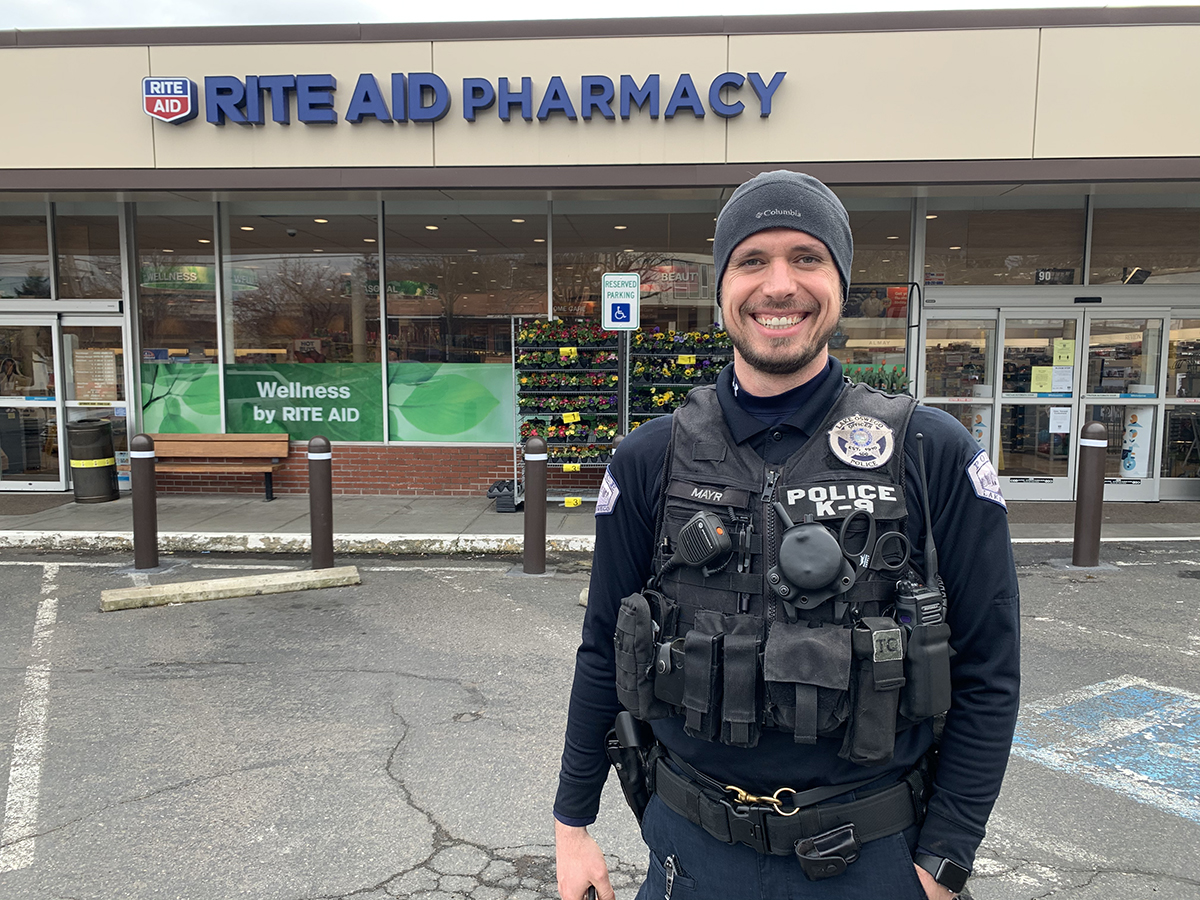
Lake Oswego Police Department was one of several police departments across the state to offer prescription delivery to seniors and medically compromised community members.
“We are in this together, we will get through this and be stronger as a result.”
- Beaverton Mayor Denny Doyle
Special Deliveries
Curtis Whipple, chief of the Rogue River Police Department, reached out via Facebook and “Trading Crows,” a flier included with the city’s water bills, to let seniors and people with pre-existing conditions know that police officers would help deliver essential supplies.
“We are determined to protect our citizens from the further spread of COVID-19. Therefore, if you fall into the higher-risk group and do not have family or friends able to assist you in getting basic needs, such as grocery shopping, please contact our department and we will assist you,” he said, adding the department teamed with Rays Food Place to assist citizens. “Rogue River is a fantastic community and everyone will do the best they can to get through these extraordinary times.”
In late March, the Lake Oswego Police Department (LOPD) initiated a pilot program to deliver prescriptions to seniors and medically compromised people. The department, which offers the service from 8 a.m. to 3 p.m. Monday through Friday, modeled its program on the Forest Grove Police Department, according to the Lake Oswego Review.
During deliveries, police department employees wear personal protective equipment and follow physical distancing guidelines to avoid spreading the virus. The employees also wear official attire and carry identification, the LOPD said in a news release.
“We want to keep people at home and keep them safe,” Sgt. Tom Hamann told the Review. “This is just a small way we could help with that.”
The Portland Fire & Rescue Bureau has partnered with Multnomah County to pick up and deliver prescription medications to vulnerable adults aged 65 and older who have a serious pre-existing medical condition such as heart or lung disease, hypertension, diabetes or cancer. Through the “MEDS on WHEELS” outreach program, a team of two firefighters will deliver the medications to homes or homeless people from a safe distance, touch base to make sure people are handling their isolation, and provide resources such as the “Senior Loneliness Line” to speak with a specialist, OregonLive reported.
Silverton’s Silver Trolley, a dial-a-ride transportation service, continues to provide rides to residents who need to go to the grocery store and pick up prescriptions and other essential items. In addition, the city has partnered with the YMCA to allow the homeless population to shower at the swimming pool even though the Day Center and the pool had to close to the public.
Restaurants, hard hit by COVID-19, focused on food deliveries and curbside pick-up orders to weather the pandemic. Through Dayton’s URBAN Program, residents and businesses can receive a rebate on their utility bills by supporting local restaurants. Those who order a $25 curbside pickup or takeout order from any Dayton restaurant receive a $15 credit on their utility bill. North Plains and other cities were implementing similar utility rebates and discounts for food purchases as well.
The city of Wilsonville’s “One Wilsonville” gift card purchase program is underway to support residents and local restaurants in need of financial relief. City employees are visiting local restaurants to purchase $20,000 in gift cards in $25 increments that will be routed to the community members in need via Wilsonville Community Sharing and the Wilsonville Police Department.
“Our staff and elected officials have been working concurrently on several programs to serve residents and business operators who are suffering financially,” said Wilsonville City Manager Bryan Cosgrove. “This one is unique in that it serves two groups with immediate need, and anyone in the community can join us in participating and supporting the Wilsonville community.”
City staff compiled a list of restaurants and other retailers currently operating, noting restaurants that are offering take-out and/or gift cards. They encouraged residents to shop or buy take-out from local businesses, purchase gift cards for future use, and donate gift cards to friends, relatives, mentors, students, neighbors, teachers, fellow parishioners, colleagues, health care workers, store clerks and others. Donations placed in the city hall’s drive-thru utility bill drop will be distributed to Wilsonville Community Sharing.
Help Extends Beyond Oregon
Oregon shared its spirit of hope and help with other states as well as within local communities. Earlier this month, Governor Brown announced that the state was sending 140 ventilators to New York, an early epicenter for the pandemic in the U.S.
“New York needs more ventilators, and we are answering their call for help,” Brown said in early April via social media and news outlets. “We’ll be sending 140 ventilators to help NY because Oregon is in a better position right now. We must do all that we can to help those on the front lines of this response.”
New York’s Governor Andrew Cuomo tweeted in response: “We are so grateful to @OregonGovBrown and the people of Oregon. On behalf of the people of NY, I thank you and rest assured that NY will repay the favor when Oregon needs it.”
On April 13, Dr. Deborah Birx praised the governors of Oregon, Washington and California through national news outlets for their proactive response in ordering physical distancing to prevent the spread of COVID-19. Also that day, the governors of the three states announced an agreement to work together as a compact on a framework for reopening when the virus subsides.
Ms. Finnemore is a Portland-area freelance writer. Contact her at precisionpdx@comcast.net.
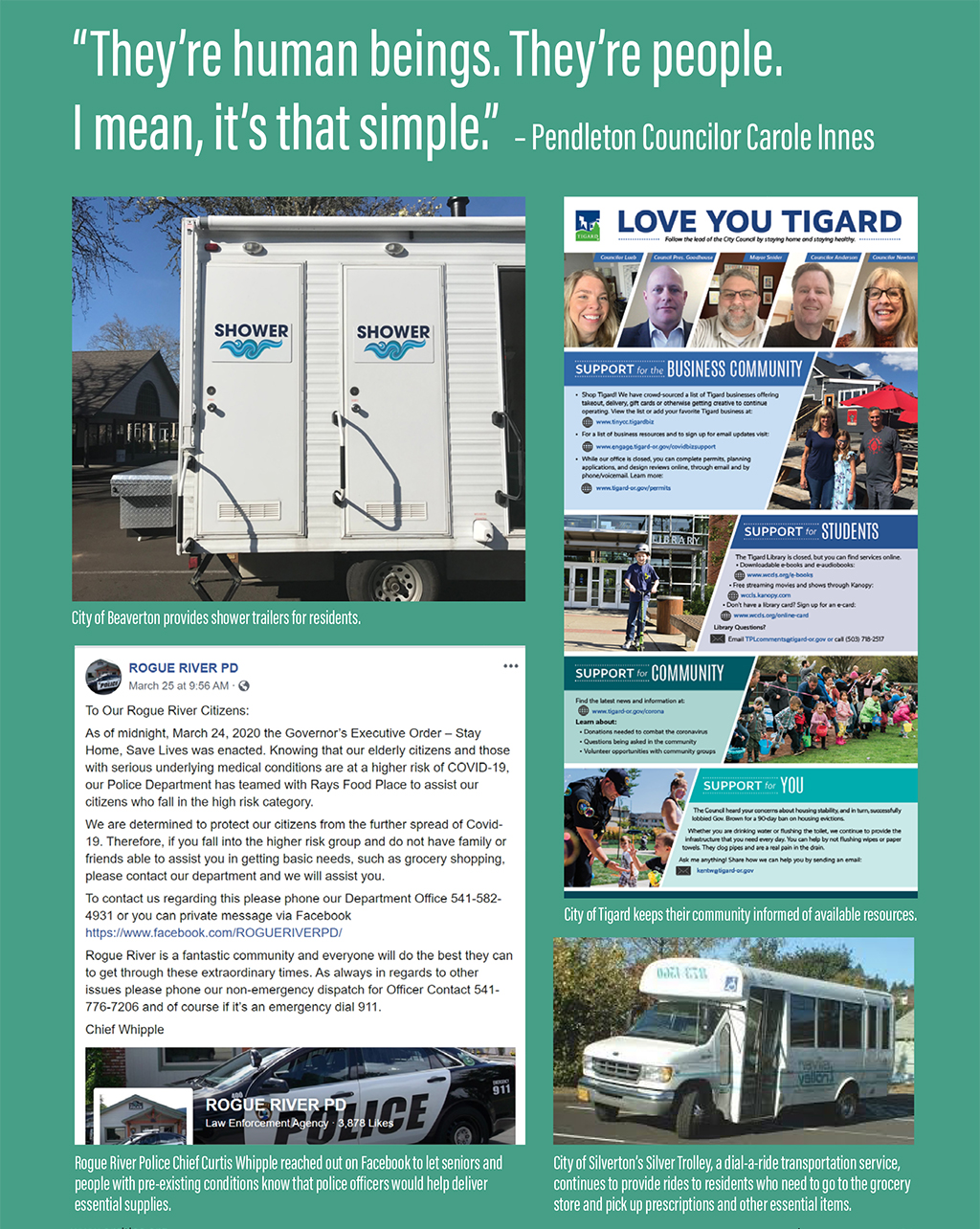
Related Articles
- From the LOC Executive Director: Rising to Meet the Challenge (Local Focus - 2nd Quarter 2020)
- Cities, Counties Support Small Business Owners through Emergency Grant, Loan Programs (Local Focus - 2nd Quarter 2020)

